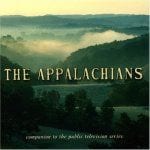
Accompanying the upcoming PBS documentary of the same name, as well as an illustrated book, The Appalachians is an admirable collection of that region’s music past and present. The job of representing the many styles that grew and evolved in the mountains from Georgia to Maine, and condensing their rich histories to a single disc, is not one that I’d envy. But this collection’s job isn’t the same as a greatest hits’. It’s to provide a quick overview, sampling as many of the different traditions as possible in a cohesive, pleasing listening experience. In that respect, it’s remarkably successful, drawing on both well-known (June Carter Cash and Johnny Cash, Jimmie Rodgers) and obscure artists (Maggie Hammons, Addie Graham), and covering over 80 years of recorded music, from Blind Alfred Reed to Paul Burch.
Music editors on PBS documentaries tend to use violins as thesis statements. The soundtrack rides Arlene Kortright’s composition “East River of Shannon” in much the same way as Ken Burns’ Civil War documentary rode Jay Ungar’s “Ashokan Farewell”, mile after haunted mile. A snippet of Robert Spates’s violin is used as an establishing shot, pastoral and wearing its Irish roots on its sleeve. Halfway through the record, it appears again in full arrangement, a kind of thematic glue to bind the collection together as one story. Rose Bell’s solo fiddle arrangement of “Amazing Grace” is lovely, sounding as if it were recorded in a tiny old wooden church. But it also functions the same way as “East River”: to unite the songs under the banner of historical and geographical tradition.
The song selection is extremely democratic. Maggie Hammons’ a cappella take on the traditional “When This World Comes to an End” will give you shivers for its content (“The moon she will be bleeding / When this world is to an end”) as well as Hammons’ delivery. Taken from the Library of Congress album Traditions of a West Virginia Family and Friends, the piece was recorded in the early 1970s, but sounds as old as the mountains in whose shadow it was sung. Hammons’ warble is palpably real. On the other side of the spectrum is the impeccably clean and smooth “Soldier of the Cross”, performed here by Ricky Skaggs. Its buttery, studio-shined harmonies and sunny religion (“You bring love to those who hate”) are polar opposite to Hammons’ apocalyptic field recordings, but it holds no less of an important place on The Appalachians. Both are integral to representing Appalachian music on a continuum, and each is evocative with its own unique pleasures.
That clan of all country music clans, the Carter Family, is rightfully well-represented with three selections, “Wildwood Flower”, “Bury Me Under the Weeping Willow”, and the June/Johnny duet “The Road to Kaintuck”, and then again when Dave Grisman and Tony Rice close the curtains with an instrumental take on “Wildwood Flower”. But there’s also the slave song “We’re Stole and Sold From Africa” by Addie Graham, and shape-note singing from a 1942 recording of the Alabama Sacred Harp Singers (“Northfield”). Old-timey collective Gandydancer turns in a finely harmonized, anti-Prohibition “Boozefighters”, and Jean Ritchie’s “West Virginia Mine Disaster” is sad and sublime.
A couple of contemporary originals are also included to demonstrate the lasting impact and continual evolution of Appalachian music. Paul Burch’s “Electricity” is good, upbeat call-and-response fun, while Jason Ringenberg’s “Price of Progress” is a downcast tale of TVA dambuilding in the 1930s. But even without younger representatives, the music on The Appalachians clearly demonstrates its relevance and vitality. After all, drinking, dancing, and Jesus have not gone out of style (and sadly, neither have exploitation, poverty, and oppression). Plus, the DNA make-up of just about every writer in contemporary folk and country is traceable to artists such as those found on this disc. Consciously or not, echoes of Maggie Hammons can be found in Joanna Newsom, and the harmonies of the Blue Sky Boys in Gillian Welch and David Rawlings. The best that The Appalachians can do is not be a definitive collection, but a thoughtfully assembled mix-tape that will give listeners the motivation to explore this heritage further.

![Call for Papers: All Things Reconsidered [MUSIC] May-August 2024](https://www.popmatters.com/wp-content/uploads/2024/04/all-things-reconsidered-call-music-may-2024-720x380.jpg)



